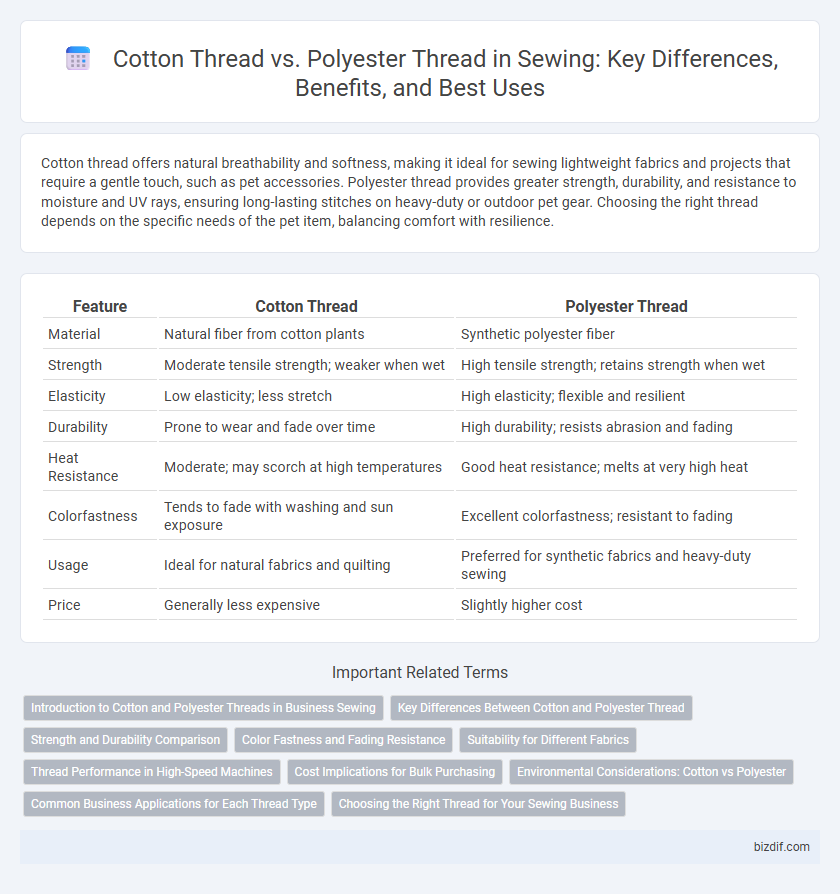Cotton thread offers natural breathability and softness, making it ideal for sewing lightweight fabrics and projects that require a gentle touch, such as pet accessories. Polyester thread provides greater strength, durability, and resistance to moisture and UV rays, ensuring long-lasting stitches on heavy-duty or outdoor pet gear. Choosing the right thread depends on the specific needs of the pet item, balancing comfort with resilience.
Table of Comparison
| Feature | Cotton Thread | Polyester Thread |
|---|---|---|
| Material | Natural fiber from cotton plants | Synthetic polyester fiber |
| Strength | Moderate tensile strength; weaker when wet | High tensile strength; retains strength when wet |
| Elasticity | Low elasticity; less stretch | High elasticity; flexible and resilient |
| Durability | Prone to wear and fade over time | High durability; resists abrasion and fading |
| Heat Resistance | Moderate; may scorch at high temperatures | Good heat resistance; melts at very high heat |
| Colorfastness | Tends to fade with washing and sun exposure | Excellent colorfastness; resistant to fading |
| Usage | Ideal for natural fabrics and quilting | Preferred for synthetic fabrics and heavy-duty sewing |
| Price | Generally less expensive | Slightly higher cost |
Introduction to Cotton and Polyester Threads in Business Sewing
Cotton thread, derived from natural fibers, offers excellent breathability and is ideal for sewing lightweight, natural fabric garments in business settings where comfort and appearance matter. Polyester thread, made from synthetic fibers, provides superior strength, elasticity, and resistance to shrinking or fading, making it perfect for heavy-duty business textiles and frequent wash applications. Choosing between cotton and polyester threads depends on fabric type, durability requirements, and project specifications within professional sewing environments.
Key Differences Between Cotton and Polyester Thread
Cotton thread is natural, breathable, and ideal for sewing lightweight fabrics, offering biodegradability and excellent heat resistance, while polyester thread is synthetic, stronger, and more elastic, making it suitable for heavy-duty and outdoor applications requiring durability and moisture resistance. Cotton thread tends to shrink and break under strain but provides a matte finish that blends well with natural fibers, whereas polyester thread resists shrinking, stretching, and UV damage, maintaining vibrant colors and higher tensile strength. Choosing between cotton and polyester thread depends on fabric compatibility, garment use, and desired sewing performance, with cotton preferred for comfort and eco-friendliness and polyester favored for resilience and versatility.
Strength and Durability Comparison
Cotton thread offers natural breathability but has lower tensile strength and tends to weaken with prolonged exposure to moisture and sunlight. Polyester thread exhibits superior strength and durability due to its synthetic fibers, resisting shrinking, stretching, and UV damage more effectively. For heavy-duty sewing projects requiring long-lasting seams, polyester thread is generally preferred over cotton thread.
Color Fastness and Fading Resistance
Polyester thread offers superior color fastness and fading resistance compared to cotton thread, making it ideal for garments exposed to frequent washing and sunlight. Cotton thread, though natural and softer, tends to lose color more quickly and fade over time, especially under harsh conditions. Choosing polyester thread enhances the durability and longevity of stitched seams in vibrant fabrics.
Suitability for Different Fabrics
Cotton thread is highly suitable for natural fabrics like cotton, linen, and lightweight wool due to its softness and breathability, ensuring a seamless blend without damaging the fabric. Polyester thread offers superior strength and elasticity, making it ideal for synthetic fabrics such as nylon, polyester blends, and stretch materials where durability and flexibility are essential. Choosing the appropriate thread enhances seam longevity and maintains the fabric's original texture and performance.
Thread Performance in High-Speed Machines
Cotton thread offers excellent strength and natural fiber compatibility but tends to produce more lint, which can clog high-speed machines and cause frequent maintenance. Polyester thread provides superior durability, low stretch, and minimal lint generation, making it ideal for high-speed sewing environments where consistent thread tension and reduced downtime are critical. High-speed machines benefit from the balanced performance of polyester thread, enhancing stitch quality and machine longevity compared to cotton thread.
Cost Implications for Bulk Purchasing
Cotton thread generally costs more than polyester thread, making polyester the preferred choice for bulk purchasing to reduce expenses in large-scale sewing projects. Polyester thread offers superior strength and durability at a lower price point, providing significant cost savings without compromising quality. Businesses that prioritize budget efficiency often select polyester thread to optimize material costs while maintaining reliable stitch performance.
Environmental Considerations: Cotton vs Polyester
Cotton thread is biodegradable and derived from a renewable natural resource, making it a more eco-friendly option compared to polyester thread, which is petroleum-based and non-biodegradable. The production of cotton thread involves significant water and pesticide use, raising concerns about its environmental footprint despite its biodegradability. Polyester thread offers durability and resistance to moisture but contributes to microplastic pollution and requires fossil fuels, impacting its overall sustainability profile.
Common Business Applications for Each Thread Type
Cotton thread is preferred for natural fiber fabrics in quilting, embroidery, and garment construction due to its softness, breathability, and heat resistance, making it ideal for apparel and home textiles. Polyester thread offers superior strength, elasticity, and colorfastness, making it the standard choice for industrial sewing, upholstery, outdoor gear, and heavy-duty applications where durability and resistance to moisture are critical. Businesses in fashion, upholstery manufacturing, and technical textiles select thread types based on fabric compatibility and end-use performance requirements.
Choosing the Right Thread for Your Sewing Business
Choosing the right thread for your sewing business depends on fabric type and project durability requirements. Cotton thread is ideal for natural fibers and provides a soft finish, while polyester thread offers greater strength, elasticity, and resistance to shrinking and mildew, making it suitable for synthetic fabrics and heavy-duty applications. Evaluating project demands and fabric compatibility ensures optimal stitch quality and product longevity.
Cotton thread vs Polyester thread Infographic

 bizdif.com
bizdif.com